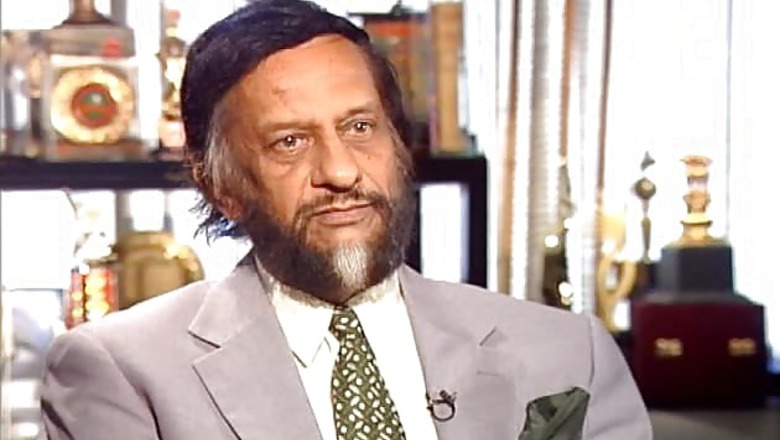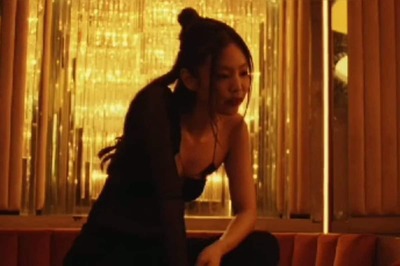
views
In Devil's Advocate this week, Karan Thapar speaks to Dr Rajendra Pachauri, the chairperson of the Inter Governmental Panel on Climate (IPCC) Change and tries to find out whether the credibility of the organisation has been damaged due to the forecast fiasco, or is the press being unfair?
Karan Thapar: Dr Pachauri some would say this is the worst possible time for the IPCC. Claims made by your oganisation on Himalayan glaciers, on African agriculture, of the flooding of the Netherlands have been found to be wrong and as a result, many people say that the IPCC's credibility is damaged and you have come under direct attack. So let me ask you: do you think the time has come for you to accept moral responsibility and resign as IPCC chairperson?
R K Pachauri: Well, I certainly accept moral responsibility but I also accept the responsibility that all the governments of the world have placed on my shoulders. That's by, essentially, electing me as chairman. By acclamation, all the countries of the world.
Karan Thapar: So you are determined to finish your term?
R K Pachauri: I have a task, I have a mission to finish the fifth assessment report and I am certainly not going to withdraw from that.
Karan Thapar: The reason I ask is because as you know, the Secretary General of United Nations has put together a committee of some of the world's top scientists to review the functioning of the IPCC. As chairperson of that organisation doesn't it embarass you?
R K Pachauri: That is wrong. Let me correct that. This is something that the IPCC has initiated. We wrote a letter to all the governments on February 16 saying that we would like to set up a review committee to look into our procedures and practices and then we joined hands with the Secretary General of the UN. You can look at the documentation, the letter to the Inter Academy Council, has been jointly signed by Mr Ban Ki Moon and me. So it is wrong to say that the Secretary General has ordered something like this?
Karan Thapar: I accept that. Many people say that had you not initiated it, the UN would have done it anyway. In other words, you initiated it to save face for you and your organisation?
RK Pachauri: Let me clarify. The IPCC is not a UN organisation. Theoretically, as an organisation, we are not responsible to the UN or the Secretary General of the UN. But, since it is a body that has been established on account of and as a result of UN General Assembly's resolution of 1988, we felt that we should join hands with the UN Secretary General. So, it wouldn't have happened anyway. We have done it.
Karan Thapar: Let me put it like this: many people believe, and many newspapers have reported that one of the primary motives of this committee is to put pressure on you personally to step down as IPCC chairperson before the IPCC's next annual assembly in Korea in October. And they are saying, would it not be wiser for Dr Pachauri to read the writing on the wall and go voluntarily rather than force a situation where it becomes distasteful or uncomfortable for you?
RK Pachauri: Well I don't know who is saying that. But let me tell you the terms of reference of that particular review committee have been drafted by us in the IPCC. It is something that has not been drawn up by anybody else and the draft and the terms of reference are very very clear. They only require the Inter Academic Council to look at the practices and procedures of the IPCC and whether there has been any failure in following those procedures and if there is any change in procedures that is required. That's all. That's the sole objective of that review. So where does my position come I don't understand.
Karan Thapar: Let me put it like this. If that review were to come to the conclusion that the principles and procedures, that the systems that the IPCC is supposed to abide by hasn't been followed, which many would take as a serious indictment of the IPCC and your chairmanship, would you then, in those circumstances, consider resigning?
RK Pachauri: Certainly not. But, we will certainly implement any constructive recommendations that we get and I believe that the purpose of this exercise is to see that we learn from whatever the community tells us, the scientific community tells us. And therefore, we are constantly in the process of improving our procedures.
Karan Thapar: So the bottom-line is: no matter what the outcome of this review, your resignation is ruled out.
RK Pachauri: No, as a matter of fact, I would be responsible for implementing the recommendations of it. How can I walk away from that?
Karan Thapar: So if there is a failure, you have an additional purpose of staying on to correct things?
R K Pachauri: Absolutely.
Karan Thapar: I which case, let's then talk about the defence that you, as chairperson of IPCC have put forward for the errors that have been revealed in the newspapers. You said: 'You said, it happened because of poor application of well established IPCC procedures,' which suggest that suggests that it is procedural; it's not the failure of the IPCC system. Let's then test that assertion with reference to what many believe is the great blunder of all, the claim that the Himalayan glaciers could be vanished by 2035. Now that particular chapter's lead author was a gentleman called Professor Murari Lal and he has publicly accepted and admitted that he is not an expert on glaciers. Why then is he the lead author?
R K Pachauri: Let me clarify to you that everything that is done in the IPCC is done by author teams and not everyone in the team has the expertise required for a particular subject.
Karan Thapar: Was he the wrong person for this subject?
R K Pachauri: Not at all because this is dealing with impacts of climate change in this region in which the glaciers are only one part. But, there is one expertise within the author team that ensures that the right level of expertise is available.
Karan Thapar: I am afraid that there wasn't that right expertise available within the author team because, let me quote the sentence: 'the likelihood of their disappearing by 2035 and perhaps sooner.' most people forget those words, '...and perhaps sooner is very high.' And the journalists say that the phrase '..very high' us a probability of 90 percent or more. Now this is said by a man who accepts that he is not an expert on glaciers.
R K Pachauri: Let me say this was an error and we have accepted that, we have mentioned that in our website. We take full responsibility for that error but let me also clarify that it was an error that crept in largely because of the procedures that are required of the IPCC and I will clearly tell you what these procedures are: when we use grey literature, the non peer reviewed literature, and that is inevitable. In several parts of the world, you don't have published literature which is peer review. In such cases, whatever information we use has to be checked, cross checked and authenticated and this, unfortunately, was a failure.
Karan Thapar: Dr Pachauri, you are making my points to me when you bring up the issue of grey literature. You have taken words out of my mouth. In fact, what makes this problem of a non-expert writing the chapter on glaciers even worse is that now you have changed your rules couple of years ago to permit the use of grey literature. And what you then have is a situation where are man who is not an expert is relying on a material that is not verified or peer reviewed. That is a recipe for disaster which is why this ludicrous claim crept into the report because the man in-charge did not have the expertise to spot how silly it was.
R K Pachauri: This is not a question of expertise. It is a question of following certain procedures. You are supposed to pick any piece of information that you get from a non peer reviewed literature - and let me clarify non peer reviewed literature has been used by the IPCC right from the beginning. When you take a country like that is Africa, where there is no peer reviewed literature, and you want to find out what the impacts of climate change are, you obviously have to rely on government reports, you have to rely on other such reports and, how are going to find out about knowledge in those areas.
Karan Thapar: I accept your point that there are times when you have no alternative to peer reviewed literature. But the further point is this that when the peer reviewed literature is used and the organisation ought to be alert to people who warn it, than a ludicrous claim is to be made?
R K Pachauri: You said non-peer reviewed literature?
Karan Thapar: Non-peer reviewed literature. When it is used, you have to be alert to the fact that mistake can be made and, when people warn you, you should listen to the wise, but you didn't. Georg Kaiser, the well known Austrian glaciologist, one of your authors as well has publicly said to the London paper, The Times, well before publication, he had contacted the IPCC and said that this is ludicrous and the IPCC ignored him. Had you listened to him, you could have saved your face?
R K Pachauri: He did not inform anybody in the authority of the IPCC and let explain to you, the IPCC functions along three working groups. He is an author in working group one. Now this problem really crept in working group two where the impacts of climate change are assessed.
Karan Thapar: Are you saying he is out of line cause, on the January 21, he told the London paper, I forewarned them, they did not listen?
R K Pachauri: Who is they?
Karan Thapar: The IPCC.
R K Pachauri: No, the IPCC is thousands of scientists. Now, he may have told some scientists in his own working group but that doesn't necessarily convey the information to the person who is responsible for this error. There was a failure of communication. If he found this error, which I believe I have been told subsequently, came much after the report had been completed.
Karan Thapar: Not just one failure of communication but, sadly, several failures of communication. David Holland, a researcher with the Global Warming Policy Foundation, has accessed documents which show that several questions were raised and again the IPCC ignored them and, if you let me finish, I will add that Pallav Bagla, who work with science magazine and lives in India sent you emails pointing out the mistake and you didn't respond?
R K Pachauri: I did not get a single email from Pallav Bagla, I am sorry to say that--
Karan Thapar: He has gone on record to say that.
R K Pachauri: He may have but I am going on record here...and if you indulge in falsehoods, Mr Karan Thapar, I will not accept it. This is not correct. This is entirely wrong.
Karan Thapar: So you are saying that Pallav Bagla who has written about it and has given interviews is wrong?
R K Pachauri: All I am saying is that I have received no email from him
Karan Thapar: What about David Holland who says that he has accessed several such communication?
R K Pachauri: David Holland, if you had looked at his background, is a climate denier, and I cannot get into a detailed technical discussion --
Karan Thapar: Does that invalidate the warnings that he issued?
R K Pachauri: No, the fact is that if these warnings have a logical basis, we certainly listen to them.
Karan Thapar: I am just putting to you a simple point. Three different people at three different level say that they forewarned the IPCC that a ludicrous mistake was going to happen and the IPCC ignored them. Isn't that a sign of a system failure?
R K Pachauri: But who have they informed in the IPCC, I would like to ask?
Karan Thapar: Presumably the concerned people?
R K Pachauri: Which concerned people?
Karan Thapar: Bagla says you but you deny it?
R K Pachauri: Well then, you have to either take his word or mine. I would like to get a copy of that email. I don't have it. There is no such email that was sent to me.
Karan Thapar: Clearly this is an issue you can sort out with Bagla, I can't sort it out. I can only tell you what he is saying in newspaper articles and in interviews. Let's move to another level of system failure.
R K Pachauri: No. Let me go back to what you have mentioned as errors. Let me clearly point out to you those are certainly not errors in the case of the Netherlands flooding issue.
Karan Thapar: I am trying to establish whether the problem is procedural or the failure of the system with specific reference to the blunder about Himalayan glaciers. That is what I am sticking to. So, let's stick to that. In November--
R K Pachauri: I have said that I accept the responsibility for that. But I also want to say categorically that this is something that did not come to our attention till about the middle of January.
Karan Thapar: The point that I am contesting is that this is not just procedural, I am saying to you and I am suggesting to you that is an indicator of the failure of the system.
R K Pachauri: I beg to differ. It is not a failure of the system.
Karan Thapar: Let me come to the next level of argument to try and prove the argument to you. In November of last year, the Indian government published a paper by an Indian glaciologist V K Raina where he said that there was nothing abnormal about the retreat of Himalayan glaciers. At that time, some would say rudely. You dismissed it as Voodoo signs.
R K Pachauri: I beg to differ. The Himalayan glaciers are melting. They are receding. There are absolutely no reasons to disbelieve that fact. Therefore, let me emphasize, the finding of the--
Karan Thapar: He didn't say they are not receding. He said there is nothing abnormal about the receding. You dismissed it as voodoo signs?
R K Pachauri: You please go through that paper. It clearly says that even in places where the glaciers are melting, it is not because of the climate change. That's a paper which has not been peer reviewed; it is not based on any data.
Karan Thapar: But wasn't is an opportunity for the IPCC to look at its own claims about Himalayan glaciers and correct them. But people say because of pride or arrogance, you dismissed another opportunity. Once again they say, it is an indication of the system and not the procedure?
R K Pachauri: It has nothing to do with the system. Let me clarify that as far as that particular paper is concerned, it has no mention of this particular date of 2035. It was on a general set of observations indicating that there is nothing to worry about as far as the glaciers are concerned.
Karan Thapar: I'll take it. Let's then come to the final level of argument where the people say that the system failed and it wasn't just procedural. You have said that, and I am quoting ‘The Hindustan Times’ of the January 20 that 'respective countries validate all reports before they are released'?
R K Pachauri: Of course.
Karan Thapar: Well that didn't happen in the case of India.
R K Pachauri: Unfortunately.
Karan Thapar: Unfortunately?
R K Pachauri: Yeah.
Karan Thapar: Then that's a system failure?
R K Pachauri: Whether you call it a system failure or a human failure, the fact is--
Karan Thapar: Human failure or system failure, you are just using terminology to try and escape from accepting that it is a system failure?
R K Pachauri: Look the point is that our systems are very clear. Let me clarify. You got to let me finish. Our systems lay down very clearly that wherever you use non peer reviewed literature, you got to carry out a cross check, you got to validate the authentication of the data you use--
Karan Thapar: It didn't happen in that case.....?
R K Pachauri: It didn't happen in this. It is a human error.
Karan Thapar: It is a system failure because all the cross checks that should have checked it out were also weren't observed. You were warned, you didn't listen to the warnings?
R K Pachauri: I dispute that. I was not warned.
Karan Thapar: Can I quote to you Prodibto Ghosh, who was in fact environment secretary at the time the report was supposedly given to the Indian government to validate before it was made public? This is what he said, again to The Hindustan Times’; 'The policy document circulated by IPCC only said that the Himalayan glaciers were melting at a fast rate. There was no mention of the 2035 figure.'
The most important thing, if had been mentioned, would have been struck down by the Indian government, was left out. That is clearly a systems failure.
R K Pachauri: No you are making all kinds of wild allegations. The fact is that this is a figure that is buried in the large group two report. It is not in the technical summary. It is not in the summary for policy makers--
Karan Thapar: Shouldn't it have been given to the Indian government?
R K Pachauri: All there reports have been given to the Indian government.
Karan Thapar: So your position is that all the facts that I have given and the Himalayan Glaciers blunder was a procedural problem not a system's problem?
R K Pachauri: Yes, of course.
Karan Thapar: Dr Pachauri, we have discussed that whether the Himalayan Glaciers blunder a system's failure or a procedural problem. UN's decision is just only procedural but the press are convinced that its a system failure. Is the press being unfair?
R K Pachauri: Well, I let all your viewers and public at large to decide on that matter.
Karan Thapar: No, you give me your answer. What do you think?
R K Pachauri: The IPCC mobilize the best talent. Thousands of scientists from all over the world and I don't want to be modest. But there have been not a single effort like this in history; whereby scientific knowledge has made such an impact on human consciousness.
Karan Thapar: No one would question the talent IPCC has. It's the system?
R K Pachauri: The point I'm going to make is -- Here's a set of reports, printed in 3000 plus pages. In that if there is one error which incidentally does not in any way dilute the findings of the IPCC. Glaciers are melting and that has major implications in the major parts of the worlds, including our sub-continent.
Karan Thapar: So you are saying, one single error has been taken out of proportion and exaggerated?
R K Pachauri: Absolutely.
Karan Thapar: Therefore you are saying to me that the focus of the press is unfair?
R K Pachauri: Yes. Look at the major contribution---
Karan Thapar: Is that yes or no?
R K Pachauri: Yes, it is unfair. But I would rather allow much your viewers and public at large to decide that.
Karan Thapar: Well, public will decide that. But one another thing public knows that British Environment Secretary Ed Miliband has written to you for a thorough overhaul of the IPCC finding. Is he being unfair as well?
R K Pachauri: No, he has not asked for an overhaul. He has only asked for why this error took place?
Karan Thapar: 'The Guardian' on February 26 says that he has wrote asking for a thorough overhaul. In fact 'The Guardian' quotes some of that later. "Mistakes such as the IPCC statements on Himalayan Glaciers are inevitably damaging the reliability and the good name of the IPCC and it is at stake?
R K Pachauri: Of course. He only asked us to go into that error and how such errors can be eliminated and not repeated in the future. But before that-- I have received the letter, the IPCC on February 16 has actually written to all the governments of the world that we would like to set up a review committee to go into this very issue. So I'm happy to see ministers like him and others who have supported on what we have decided to do.
Karan Thapar: Are you saying that 'The Guardian' is wrong in reporting that he has asked for the thorough overhaul?
R K Pachauri: No, he didn't ask for a thorough overhaul.
Karan Thapar: What about your predecessor Bob Watson, who in speaking to two British papers said that the structure and the working of the IPCC need to be revised. Is he unfair as well?
R K Pachauri: I hope that when I have stepped down from my position in 2015 also. I don't have to comment on my successor and what he does. Once I 'm out of the IPCC and I have defeated Bob Watson in a fair election where I got 76 votes and he got 49.
Similarly if I step down in 2015, I am not going to comment on my predecessor.
Karan Thapar: So Bob Watson comments on the need for a thorough overhaul is a motivated comment?
R K Pachauri: I won't say that but I won't comment on that.
Karan Thapar: Can I put one thing to you?
R K Pachauri: Yes .
Karan Thapar: Are you beginning to fear that both you as chairperson and the IPCC are surrounded by unfairness and perhaps seem by people looking at you?
R K Pachauri: I have no such fear. In fact we have an open mind. W are very open to criticisms, we are very open to learning from errors. I can assure you that the fifth assessment report which we are embarking on very soon, We will do everything possible- that is humanly possible to see that we eliminate or at least get rid of such possible criticism.
Karan Thapar: can you with confidence tell me that what ever sort of errors or error that been reported in the fourth report won't be there in the fifth.
R K Pachauri: We will do everything possible- that is humanly possible to ensure that.
Karan Thapar: Dr Pachauri, pleasure talking to you.
R K Pachauri: Thanks.




















Comments
0 comment